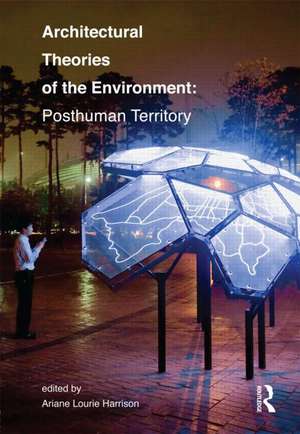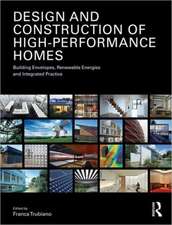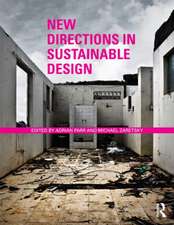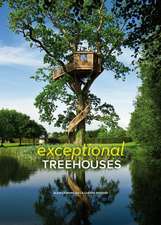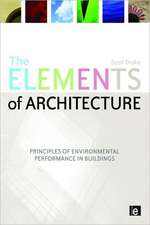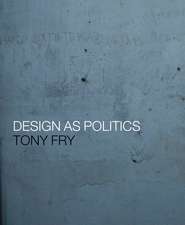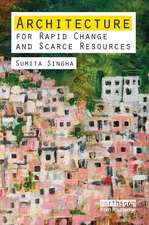Architectural Theories of the Environment: Posthuman Territory
Editat de Ariane Lourie Harrisonen Limba Engleză Paperback – 3 dec 2012
Here, for the first time, editor Ariane Lourie Harrison collects the essays of architects, theorists, and sustainable designers that together provide a framework for a posthuman understanding of the design environment. An introductory essay defines the key terms, concepts, and precedents for a posthuman approach to architecture, and nine fully illustrated case studies of buildings from around the globe demonstrate how issues raised in posthuman theory provide rich terrain for contemporary architecture, making theory concrete. By assembling a range of voices across different fields, from urban geography to critical theory to design practitioners, this anthology offers a resource for design professionals, educators, and students seeking to grapple the ecological mandate of our current period.
Case studies include work by Arakawa and Gins, Arons en Gelauff, Casagrande, The Living, Minifie van Schaik, R & Sie (n), SCAPE, Studio Gang, and xDesign.
Essayists include Gilles Clément, Matthew Gandy, Francesco Gonzáles de Canales, Elizabeth Grosz, Simon Guy, Seth Harrison, N. Katherine Hayles, Ursula Heise, Catherine Ingraham, Bruno Latour, William J. Mitchell, Matteo Pasquinelli, Erik Swyngedouw, Sarah Whatmore, Jennifer Wolch, Cary Wolfe, and Albena Yaneva
| Toate formatele și edițiile | Preț | Express |
|---|---|---|
| Paperback (1) | 456.50 lei 6-8 săpt. | |
| Taylor & Francis – 3 dec 2012 | 456.50 lei 6-8 săpt. | |
| Hardback (1) | 992.06 lei 6-8 săpt. | |
| Taylor & Francis – 14 dec 2012 | 992.06 lei 6-8 săpt. |
Preț: 456.50 lei
Nou
Puncte Express: 685
Preț estimativ în valută:
87.35€ • 91.45$ • 72.28£
87.35€ • 91.45$ • 72.28£
Carte tipărită la comandă
Livrare economică 05-19 aprilie
Preluare comenzi: 021 569.72.76
Specificații
ISBN-13: 9780415506199
ISBN-10: 0415506190
Pagini: 336
Ilustrații: 1 black & white tables, 76 black & white halftones, 17 black & white line drawings
Dimensiuni: 174 x 246 x 18 mm
Greutate: 0.62 kg
Ediția:New.
Editura: Taylor & Francis
Colecția Routledge
Locul publicării:Oxford, United Kingdom
ISBN-10: 0415506190
Pagini: 336
Ilustrații: 1 black & white tables, 76 black & white halftones, 17 black & white line drawings
Dimensiuni: 174 x 246 x 18 mm
Greutate: 0.62 kg
Ediția:New.
Editura: Taylor & Francis
Colecția Routledge
Locul publicării:Oxford, United Kingdom
Public țintă
Postgraduate, Professional Practice & Development, and UndergraduateCuprins
Introduction: Charting Posthuman Territory Part 1: Posthuman Subjects Unfinished Work: From Cyborg to Cognisphere N. Katherine Hayles 2. Post Animal Life Catherine Ingraham 3. The Next Subject Seth Harrison 4. Approaching a New Biotope Francisco González de Canales 5. The Biosphere of Machines: Enter the Parasite Matteo Pasquinelli Case Studies: Arakawa and Gins, Bioscleave House, East Hampton, NY, 2000-2008 Arons en Gelauff, The Plussenburgh, Rotterdam, The Netherlands, 2001-2006 R&Sie (n), I’m Lost in Paris, Paris, France, 2008 Part 2: Posthuman Assemblies 6. Give Me a Gun and I Will Make All Buildings Move: An ANT’s View of Architecture Bruno Latour, Albena Yaneva 7. Lose the Building: Form and System in Contemporary Architecture Cary Wolfe 8. Pragmatic Ecologies Simon Guy 9. Futures, Cities, and Architecture Elizabeth Grosz 10. Against Program William J. Mitchell 11. Metabolic Urbanization: The Making of Cyborg Cities Erik Swyngedouw Case Studies: Minifie von Shaik, Australian Wildlife Heath Center, Melbourne, Australia, 2006 The Living, Living Light Pavilion, Peace Park, Seoul, South Korea, 2009 Studio Gang Architects, Ford Calumet Environmental Center, Calumet, Illinois, competition 2004, Millennium Reserve Initiative 2011 Part 3: Posthuman Territory 12. Zones of indistinction: Bio-political Contestations in the Urban Arena Matthew Gandy 13. Anima Urbis Jennifer Wolch 14. Hybrid Cartographies for a Relational Ethics Sarah Whatmore 15. The Emergent Alternative Gilles Clément 16. Risk, Globalization and the Cosmopolitan Imaginary Ursula Heise Case Studies: The Living and Nathalie Jermaijencko, Amphibious Architecture, East River, New York, 2009 SCAPE, Oyster-tecture Project, 2010; Pilot in Brooklyn, NY, 2012 Marco Casagrande and C-Lab, Ruin Academy, Taipei, Taiwan, 2010–present
Recenzii
“In its strength of research, its sharp investigation, its originality of view and its colossal significance, this is an outstanding work. Ariane Lourie Harrison has edited one of the most innovative collections on environmental architecture theory I’ve read.”
Mitchell Joachim, New York University, USA and Co-President, Terreform ONE
“This excellent compendium assembles a select group of thinkers and designers engaging in the challenge of posthuman thought, and suggests avenues forward which will expand architecture’s capacity to perceive, comprehend, and respond to this paradigm shift in thinking. It is a much needed survey that should indeed help us to go beyond the human while remaining, somehow, thinkers and builders of the human.”
Edward J. Keller, Parsons The New School for Design, USA
“This significant collection of essays and case studies edited by Ariane Lourie Harrison explores some of the most critical questions surrounding sustainability vis-à-vis the notion of posthumanism. Harrison’s thoughtful introduction sets forth a clear framework for the book, while the format of combining theoretical texts with well-analyzed and illustrated case studies is as rarely seen as it is highly effective, enabling connections to be made between concepts and actualizations.”
Amanda Reeser Lawrence, Northeastern University, USA
Mitchell Joachim, New York University, USA and Co-President, Terreform ONE
“This excellent compendium assembles a select group of thinkers and designers engaging in the challenge of posthuman thought, and suggests avenues forward which will expand architecture’s capacity to perceive, comprehend, and respond to this paradigm shift in thinking. It is a much needed survey that should indeed help us to go beyond the human while remaining, somehow, thinkers and builders of the human.”
Edward J. Keller, Parsons The New School for Design, USA
“This significant collection of essays and case studies edited by Ariane Lourie Harrison explores some of the most critical questions surrounding sustainability vis-à-vis the notion of posthumanism. Harrison’s thoughtful introduction sets forth a clear framework for the book, while the format of combining theoretical texts with well-analyzed and illustrated case studies is as rarely seen as it is highly effective, enabling connections to be made between concepts and actualizations.”
Amanda Reeser Lawrence, Northeastern University, USA
Descriere
These essays by architects, theorists, and sustainable designers together provide a framework to help you develop your own guidelines to approaching to your work. Introductions define key terms, and nine case studies demonstrate the concepts.
